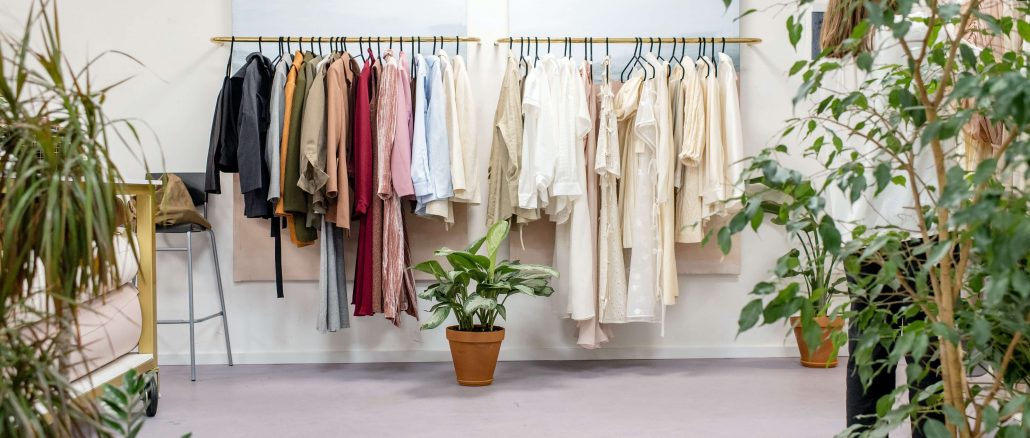
[dropcap]A[/dropcap]s fashion retailers were forced to close their doors and the frenzy of sartorial shoppers retreated online, there seemed little hope for the world of fashion rental in the wake of lockdown restrictions.
For a lot of fashion rental services, 2020 was the year that they had just found their feet. It was also a year where the fashion industry was already experiencing an existential crisis of sorts.
Eco-conscious consumers demanded more and fast fashion conglomerates were being questioned and undermined. A raft of investigations and campaigns into the ugly truths of the production of fast fashion soon followed.
Fashion rental services fitted nicely into this shift that was occurring. A service where you can rent high-end fashion at a reduced cost is conducive to the circular economy and boycotts the mass production of wear-once-and-discard items. Unfortunately, it isn’t as conducive with the heightened awareness people have around hygiene standards and sharing items with others.
Presumably, the rental sector would take a nose-dive into a loss of profits like its brick-and-mortar counterparts. However, during the pandemic many rental services recorded their busiest month on record.
For My Wardrobe HQ, the UK’s first rental marketplace, a 50 per cent increase in stock listed by brands and private lenders was recorded over the pandemic. The social shopping platform acts as both a rental business and consignment store for brands and private sellers, allowing users to borrow pieces for four days to a fortnight, or to buy the preloved items for a fraction of the original cost.
Welcoming the same increase was founder of UK rental app By Rotation, Eshita Kabra-Davies. The platform which launched in 2019, recorded a 100 per cent increase in registered members since March 23, 2020, the day the UK went into lockdown. The number of listings on the site also grew by 130 per cent over this period, as more people wanted to reap the benefits of monetising their wardrobe.
How did the rental sector play out in an Irish landscape as Covid-19 sieged our shores?
Borrower Boutique, a Dublin-based fashion rental service established in 2015, has described the survival of their business model amid the pandemic as “really difficult”. A lot of their stock is purchased while travelling, and the inability to do that over the past year has pushed the business back to the drawing board.
This has been somewhat of a blessing for the three style-savvy founders Johanna Dooley, Sarah Monahan and Chloe Best, as it has encouraged them to celebrate the talent of Irish designers. It also gave them time and space to revaluate their business:
“The pandemic has allowed us to focus on aspects of the business that we just weren’t getting to before..we set up a brand new website with a booking calendar and it allowed us to sell off old stock. We really used the time to research and plan too,” Co-founder Johanna Dooley told The College View.
Like their competitors in the UK, Borrower Boutique recorded an increase in support and interest in their listings during the pandemic, with customers now renting for at-home birthdays, remote graduations and other celebrations.
The founders of Borrower Boutique established their enterprise in a time where fashion-rental was associated only with formal and occasion wear. The trio began their venture with an Instagram page that they communicated with customers and rented their personal items of clothing through. The then-college students spent their weekends driving to various customer locations to deliver the items.
Six years later, a lot has changed. Their rental service now offers a holiday shop, evening wear, a wedding edit and a roster of cult brands such as Rixo, Rotate Birger Christensen, Sandro, Self Portrait and the quintessential US millennial brand, Sleeper.
Their modus operandi has improved too, now resembling a very user-friendly model.
Customers can browse the website, choose their outfit and rent it for as little as three days or as long as three weeks. The item is then delivered to the customer’s door, with the option of a try on service available at a cost of €20.
The user then sends the item back via registered mail, and the service takes care of the dry cleaning and sanitation regime, the cost of which is either included in the item’s price or tallied in at the end.
The founders are currently working to develop their model to allow individuals to lease their own wardrobe favourites on the site.
Since establishing Borrower Boutique, Dooley has noticed a shift in consumer attitudes towards the concept: “ Initially, we spent a lot of time educating our customers on the whole idea of renting clothing.
“Although it took some time, we have seen a transformation in people’s perceptions of the rental market. We have found that the behaviour has changed from hiding the fact that they rented an item or bought a second hand piece of clothing to promoting it,” Dooley said.
This shift in attitude can only be a telling sign of how quickly the industry is changing, and how reliant the fashion leaders of the world are on consumer trends and attitudes. A major shift in consumer attitude now might just be the foundation of retail models in the future – something we will welcome with open arms.
Author: Trudy Feenane
Image Credit: Ksenia Chernaya on Pexels



